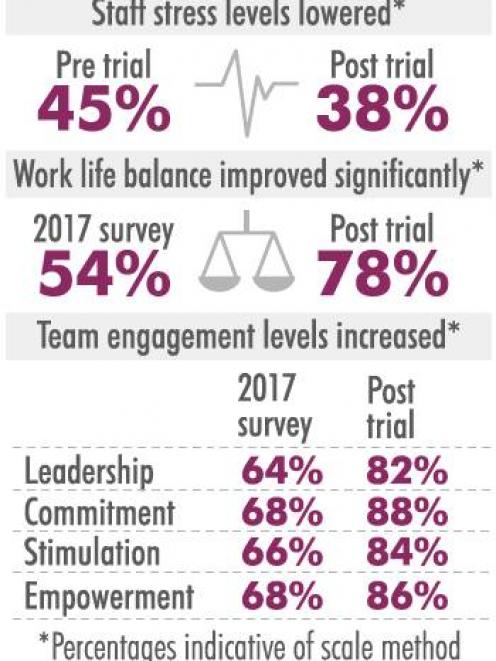
The old recipe of five days' work, involving 40 hours of graft, is giving way to patterns better suited to our lives, Alanah Eriksen writes.
Chances are that last week you worked just 32 hours, having had Labour Day off on the Monday.
It is also quite likely that you chugged through just as much work as you normally would in five days and 40 hours.
That's something more businesses are signing up to - the shorter weeks and hours part - on a permanent basis.
It is certainly working for Willem van der Steen, who heads a team of 14 at Perpetual Guardian.
Work in Auckland's Queen St is about 19km from his West Harbour home, which, during peak-hour traffic, can take more than an hour each way.
But Willem van der Steen is able to pick up his son Alex from school by 3.15pm most days and by 4pm you might find them on the water, or exploring nature. And he often gets to take long weekends.

The old 40-hour, five-day-a-week routine is, if not dead and buried, then at least fast falling out of favour.
Van der Steen is the head of digital at Perpetual Guardian, which this week officially introduced its four-day working week after a six-month trial.
Staff can take an extra day off, or work shorter days to meet the threshold for the new 32-hour week.
Van der Steen tries to be in the office by 8am and leave before 3pm. He takes an hour for lunch so works about six hours a day. Or, if he wants to go away with his partner and son, he will work eight hours a day and take Friday off.
The company's hours were previously structured from 8.30am to 5pm, Monday to Friday.
Van der Steen's partner is a primary school teacher and can't leave work before 5pm. Before his new hours, the couple relied on after-school programmes, or Grandma, who lives nearby, to take care of Alex.
"I don't have to stress with the traffic," he says.
"If I end up doing some work from home, it's OK, because I am home. I've got the little one around, I can play with him.

"You can go out of Auckland for a long weekend, go to the beach, go to the Waitakere Ranges, go for a nature walk, kayak around Herald Island."
All van der Steen's team have opted into the reduced work week.
"Before, you'd check the news headlines, check Facebook," he says.
"We're still getting work done; it's just much more focused.
"My team is very efficient in six hours. The first two weeks were weird. But now the meetings are shorter - we have 45-minute stand-ups. Everything is just a little bit faster.
"The lazy questions are gone. It's more actionable requests."
There is no punishment if staff don't complete their work within the 32 hours, but a conversation about what's stopping them achieving it is had, van der Steen says.
He is still contactable out of hours but staff are more wary about bugging colleagues.
"If they need you, they can text, call or email, but there's an agreement that it's only if there is an emergency, not just for chit-chatty stuff. People have to think about what they are asking you and whether it can wait."
The Dutch native has lived in New Zealand for two years and says companies in the Netherlands offered reduced hours but you had to take reduced pay.
Perpetual Guardian director Andrew Barnes started a trial for the reduced week in March to see what impact it would have on productivity levels at the business.
Employees who opted in were eligible for a weekly rest day provided they met their weekly productivity objectives. They were paid their usual salary.
This initial test was a success; independent academic research showed productivity levels were maintained and job satisfaction among staff members improved markedly.
Since the venture, about 15 Kiwi businesses have been in touch with the company, keen to learn more about the idea, says a spokeswoman.
"Most of these businesses have been researching how to implement a similar form of flexible working structure into their own businesses."
They have also received interest from about 35 companies around the globe.
Perpetual Guardian is producing a white paper this month detailing what it learned from its trial and what it has done to achieve the move. It has received more than 120 requests for a copy, including from 23 New Zealand businesses.
It has been 178 years since London-born Wellington carpenter Samuel Parnell refused to work more than eight hours a day, sparking a wider movement in New Zealand (he informed other workmen arriving on incoming ships of the local custom). Fifty years later, the country's first Labour Day was observed and has been since - the latest, this past week.

Parnell was on to something, but maybe it's time to take his idea further. While the broad perception may be that flexible hours are the preserve of mothers with child care responsibilities, this is far from the reality.
Research by Timewise, a UK company that advertises part-time and flexible roles, found child care was not the most common reason given for working flexibly or choosing part-time work. Only 35% of part-timers who would prefer to continue working part-time cite caring responsibilities as their reason, compared with 36% citing general convenience, 40% wanting to enjoy leisure time or study and 48% looking for the catch-all "work/life balance".
New Zealand's employment legislation does not define what full-time or part-time work is, but full-time work is often considered to be 35 to 40 hours a week.
For statistical purposes, Statistics New Zealand defines full-time as working 30 hours or more per week. It says there are 546,600 part-time workers in New Zealand and 2.02 million full-timers.
An analysis last year showed 400,000 of the part-timers did not want to take on any more hours.
A search on TradeMe jobs found 3142 listings using the keyword "flexible".
As well as flexible hours, more New Zealand companies are offering support for staff who have children.
Media company NZME - which prints The New Zealand Herald - gives primary carers a $5000 one-off payment on top of the Government's statutory paid leave benefit of 22 weeks - which went up on July 1 from 18 weeks - at a maximum $538.55 a week.
It also offers an additional two weeks' paid leave - which can be taken in a block or broken up and used as individual days over six months - for eligible partners of primary carers.
ANZ has increased its paid parental leave to 26 weeks. And My Food Bag - co-founded by working mums Nadia Lim and Cecilia Robinson - offers 18 weeks' paid leave for new mums on top of the 18 weeks' leave paid by the Government.
If staff choose to work through the extra 18 weeks, the company boosts their salary.
My Food Bag also provides all parents with an additional six parental sick days per year.
As well as flexible hours, flexible locations are on the rise.
The Straker Group, a tech company based on Auckland's North Shore, has moved some of its operation to Gisborne.
The company asked its 38 New Zealand employees whether they wanted the office moved into the city centre, so more of the city was available to younger staff struggling to buy their first home in the inflated property market.
Staff wanted them to go further. So in June, company founders Merryn and Grant Straker opened an office in Gisborne. Nine staff have moved and a further 11 are likely to join in the coming year.
Zany offices are also keeping 21st-century workers engaged.
At Google's New Zealand headquarters, on the 27th floor of downtown Auckland's PwC tower, the main office has beach umbrellas, a crib-style side room for meetings, and quirky decor typical of the company's offices.
The global tech company is widely regarded as having some of the best offices in the world, including secret rooms in an Ontario building, an indoor basketball court in Zurich, slides and games rooms, rooftop mini-golf or in-house masseuses.
The preference for flexible working is strong among both men and women, says Timewise. The vast majority (84%) of male full-time workers work flexibly or say they want to, compared with 91% of female full-time workers.
More conversations about how to work flexibly, rather than why, are needed, argues co-founder Karen Mattison.
"The whole link between the reason for working flexibly being children or caring responsibilities has held back the discussion about flexible working.
"We haven't talked enough about how we make it work but [have been] focusing on why, and actually the much more interesting and valuable conversation is how do we make it work when, say, four people in a team do three days a week, three people do four days, and two people work from home?"
The reasons for wanting to do things differently should ultimately not even be relevant, she suggests. "We don't believe there's [any such thing as] a `good' or `special' reason. The direction of travel should be towards reason-neutral."

How to ask for flexible working
Karen Mattison, joint chief executive of Timewise, gives her top tips:
DO YOUR RESEARCH
If the job advert is not clear about what flexibility, if any, is possible, it is a good idea to call and ask the HR department before you apply. It is also worth asking whether they already have people working flexibly. This is the major sign flexibility will be a possibility.
KNOW YOUR WORTH
If you hold a senior position, have hard-to-find skills and top-notch experience, you have much stronger negotiating powers. The jobs market is turning, and employers are struggling to find suitable candidates for some roles. Capitalise on this.
SHOW YOU CAN MAKE IT WORK
Demonstrate how you make it work in your current role, without apologising for it. For example: "My working pattern is currently a four-day week and I consistently meet my sales targets. Would you be able to match this?".
DON'T LEAD ON THE FLEX ISSUE
Avoid the mistake of sounding as if you have only applied because it is a job with flexible working options. First and foremost, you have applied because you have the right skills, it is a great role, and you want to work for this company. No-one wants to hire someone who is only applying because the job is part-time.











